
We speak with 22-year-old Palestinian journalist Abubaker Abed in Ireland after he evacuated Gaza last month suffering from malnutrition and under threat for his reporting on Israel’s genocide. Abed describes himself as an “accidental war correspondent” and hoped to become a sports journalist and commentator before the start of the war, but spent much of the last two years reporting on daily death and destruction. He says leaving Gaza was “a very agonizing decision” for him and that he feels tremendous guilt for now having access to food, water and medicine while so many Palestinians continue to suffer. “I can’t really tell you that I’m safe here. I’m probably a physical survivor, but not an emotional survivor. The images that I took with me from Gaza are still haunting me,” says Abed. “My whole family is still in Gaza, my friends, my colleagues. And all of them, I’m just thinking about them every single second all day.”
Transcript
AMY GOODMAN: This is Democracy Now!, democracynow.org.
We go from Gaza to someone who was just in Gaza when we last spoke to him. Abubaker Abed is a 22-year-old journalist from Deir al-Balah. He used to be a football, or soccer, commentator, but now, as he says, he’s an accidental war correspondent. In recent weeks, he’s been evacuated to Dublin, Ireland, to continue his education and get medical treatment for malnutrition. He received a scholarship to study as he heals. His new piece for Drop Site News is headlined “The Unbearable Pain of Leaving Gaza.”
Abubaker, welcome back to Democracy Now! We last spoke to in Gaza. Now you’re in Dublin. Talk about that journey that you took, and your thoughts as you listen to another report from Gaza City, a report that you might have given several months ago.
ABUBAKER ABED: Yeah, thank you so much, Amy, for having me.
Of course, it’s a very — it’s been a very agonizing decision, a very heartbreaking one. And let me just say first that everyone in Gaza should have this chance to get the treatment. Everyone in Gaza should have the right to continue their education. I’m not better than anyone inside Gaza at the moment. But, yes, for a 22-year-old to take such a decision at such a time, in a very, very young age, is absolutely traumatizing.
I was forced to it, because at that time I was very malnourished, and if I stayed, because of the blockade — and we heard the report on the ongoing starvation — a blockade of every corner of the Gaza Strip is just lethal. So, if I stayed, I would die. All Gaza right now is starving. So I was left with no choice.
And this wasn’t the only reason, to be honest, because at the same time, I was threatened multiple times. Yesterday, Israeli warplanes bombed the burns ward inside the hospital, killing journalist Hassan Islayeh. He’s literally the most famous, renowned journalist inside Gaza. Everyone really learned from him. I learned from him. And he brought journalism to Gaza. He’s been covering Gaza since 2009, three years after the blockade or the siege that Israel opposed on the territory. So, when you look at the number of journalists killed in Gaza, more than 215, and I was — I’m very fortunate to have survived. But again, I don’t — everyone deserves this chance. Everyone should have the right to education, to health, to everything.
But I can’t really — I can’t really tell you that I’m safe here. I’m probably a physical survivor, but not an emotional survivor. The images that I took with me from Gaza are still haunting me all the night. And I can tell you, like, over the past three weeks, since arriving here, many nights I didn’t sleep at all, because every place, every beautiful place I visited here in Dublin or around Ireland, it was — I had that secondary instant idea that this place would be bombed anyways, and I would see it lying in ruins, even the home where I reside in right now. So, the trauma is relentless.
And my whole family is still in Gaza, my friends, my colleagues. And all of them, I’m just thinking about them every single second all day. And this shouldn’t be — again, this shouldn’t be the life of a 22-year-old. And I didn’t want to make this decision. I wanted to stay. But when a son hears from his mom that — telling him that he is going to harm his own family and harm her, your home country is no longer your home. You have to flee. You have to leave, because your mom thinks you are a danger. Your family thinks you’re a danger. And everyone felt that I was going to be the next target. And myself, I knew that I was going to be the next target. So, when you’re put under such circumstances, this is just an unfair world and filled with corruption that no one can really describe. So, this is just a very traumatizing and agonizing decision, and I don’t know what to say anymore.
AMY GOODMAN: If you can talk about what it is like to watch the news outside about what’s happening inside, and what is happening directly to your family inside now, though you have made it out, Abubaker?
ABUBAKER ABED: It’s unfair. It’s traumatizing. And I constantly live in fear, just thinking about my family. I try to have some joy here, but it’s painful joy. I don’t have a taste of any food. I don’t have taste to the pure water that I drink right now. I remember the times when I was in Gaza, I was drinking contaminated water coming from the sewage, and it was really causing me a lot of pain. But right now, even when you think about it, that someone has been taken from hell to heaven, it’s really hard to process.
And, you know, I’m not there anymore. So, if I — I don’t know, but if anyone — like, for example, I should have been today with the other journalists, one there of our colleagues, our brave colleague Hassan Islayeh, who was deliberately assassinated by Israel. And the killing spree continues to grow every single day towards journalists. So, I should have been there, but I’m watching right now in silence, surrounded by fear, by fury, by wrath.
I really want to do something, and I’m trying to do something from here to try and tell the governments, tell the people, that we need to do something, because this is not — Amy, this is not some sort of aberration. This is deliberate genocide, starvation by design, an act to try and wipe out the entire Gazan population, from the young to the elderly, because we’ve seen the systematic erasure of entire families in Gaza, more than has been — as it has been reported, more than 1,200 families have been wiped out.
And one week before leaving Gaza, my aunt’s family was killed — was bombed, sorry. And my cousin, who was 45 years old, her husband was killed, she was killed, and all of her six children. So, all of the family was wiped out now. Their memories, their home, everything about them has now been — is now erased because of Israel.
So, Israel continues bombing Palestinians. I can’t really — I’m praying every single day that a ceasefire will be achieved, an agreement will be hashed out. But I’m trying to do something from here, but I can’t tell you anything. But I feel very guilty for the water that I drink, for the fresh food that I have, for the good medications. Even I’m taking right now gastro-resistant pills and paracetamols and just other multivitamins that are — these are just simple medications that it should have had in Gaza, but right now I’m taking these simple medications that I was forced to get out just to continue my education and take these medications, very simple medications.
So, what is the objective that Israel is trying to achieve by blocking the entry of aid, food and medications into Gaza? This is just the peak of terrorism that Israel is doing and the hell that Israel has inflicted upon Palestinians, particularly the children, given the fact that half the population is children. This hell is just unprecedented. And the conditions, as I’m talking to my family, and I’m hearing the bombings from abroad — I was hearing them in Gaza — I feel very frightened, very terrified, and I can’t — I can’t really have a good moment of safety here. I’m not safe. I’m just a physical survivor.
AMY GOODMAN: Finally, I’m speaking to you as President Trump is in his first major international trip. It’s to Saudi Arabia. It’s to the United Arab Emirates. It’s to Qatar — Qatar, which has been a country that is negotiating, supposedly, a deal between Hamas and Israel — of course, with U.S. involvement. What message do you have to these countries?
ABUBAKER ABED: That it is enough. It’s enough. We’re not a party to this war. And this is something I told you while I was in Gaza. We’re not a party to this war. We’re not — we didn’t do anything to be suffering that way, that all the Palestinians right now trapped in the territory are still suffering every single day. They cannot — they don’t have access to water. They don’t have access to food. My family is suffering relentlessly. They don’t have anything. And that this, what is happening, is something that has to stop, because we are humans like anyone across the globe, and we have the right to live. We have the right to have a normal life, because the simplest things here in this country, in Ireland, are not available for people in Gaza. I’m seeing the leftovers people leave in the wastebaskets. Those things are precious for Palestinians, for my family, for everyone in Gaza. But you can see the different worlds that we are living in.
A whole community, a whole population is being genocided live now, while an entire world of 9 billion people is just to stand by passively, not being able to send one bottle of water or can of food to children who are starving, who are being brutalized, traumatized and ostracized, as if their lives have no value at all.
AMY GOODMAN: Abubaker Abed —
ABUBAKER ABED: And Israel’s war crimes go just unpunished —
AMY GOODMAN: — I want to thank you so much for being with us. We have to leave it there. We’ll continue our conversation at democracynow.org.

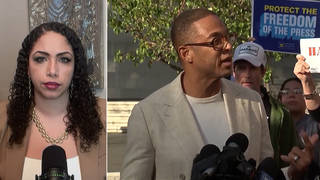
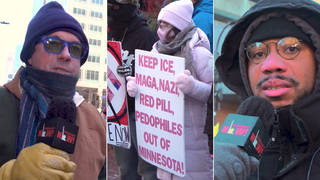
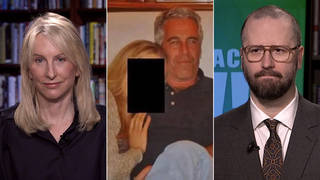
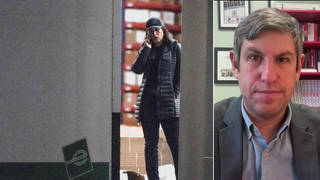






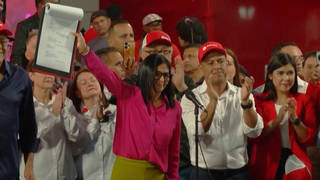
Media Options